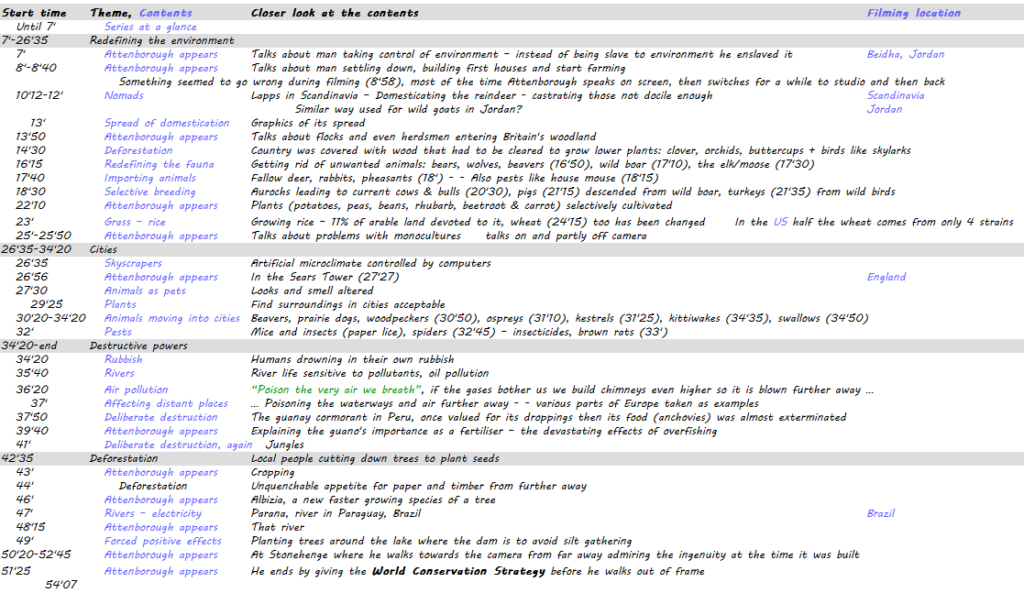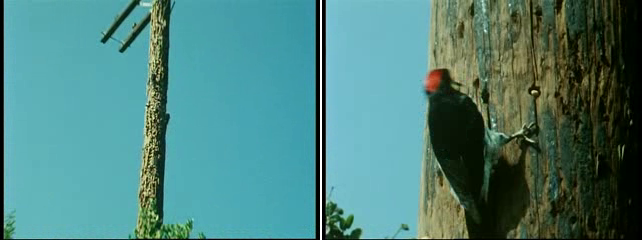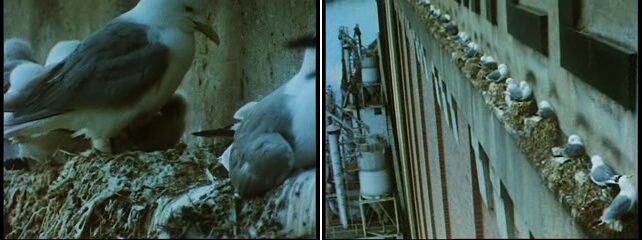Original air date: 12 April 1984


Selected material
What city life is to animals moving in from the wild
Attenborough describes in a very humourous way how wild birds tackle buildings in urban areas (quotations are from the subtitles)

“… in the south-west of the United States, acorn woodpeckers store their acorns in the trunks of fir trees, even when they’ve been turned into telegraph poles” (30’55-31′)

“Church towers, to kestrels, are just as good nesting sites as rocky crags”

“Kittiwakes apparently regard modern buildings as little more than particularly regular sea cliffs”
Final words:
“… Immensely powerful though we are today, it’s equally clear that we’re going to be even more powerful tomorrow. And there will be greater compulsion to use our power as the number of human beings on earth increases still further. Clearly, we could devastate the world. If we’re not to do so, we must have a plan. A plan has been formulated by environmental scientists. They called it the World Conservation Strategy and it rests on three simple propositions.
One: That we shouldn’t so exploit natural resources that we destroy them. Common sense, you might think. Yet look what we’ve done to the European herring, the South American anchovy, and are still doing to the whales.
Two: We shouldn’t interfere with the basic processes of the earth on which life depends, in the sky, on the green surface of the earth and in the sea. And yet we go on pouring poisons into the sky, cutting down the tropical rainforest, dumping our rubbish into the oceans.
And third, that we should preserve the diversity of life. That’s not just because we depend upon it for our food, though we do, nor because we still know so little about it that we won’t know what we are losing, though that is the case as well, but it is surely that we have no moral right to destroy other living organisms with which we share the earth.
As far as we know, the earth is the only place in the universe where there is life. Its continued survival now rests in our hands.“
This final episode is about man’s treatment of the planet. In the first part, man tries to use his superior brainpower to become master of nature, gradually redefining it with interbreeding of species. Man’s need make him flock into cities where certain parts of nature come along. The second part concentrate more in man’s destructive powers: pollution and deforestation with final words about its huge costs.
There are serious problems with growing only a single or possibly a few plant species.
Selectively cultivating plants leads to so-called ‘monocultures’: from the numerous species of plants growing in a certain area only one or a few are selected, the rest are eradicated. As mentioned elsewhere (Finding Food episode in the Trials series) birds and insects depend on various plants as their energy resources (nectar or fruits). If the food cannot be found the animals move away or starve. This along with poisoning (and a few other reasons) has led to so called “insect armageddon”.
Further reading:
Sally McGrane (2017). Krefeld Journal. The German Amateurs Who Discovered ‘Insect Armageddon’
More than 75 percent decline over 27 years in total flying insect biomass in protected areas
Nature. 550 (7677): 433. 18 October 2017Flying insects are disappearing from German skies